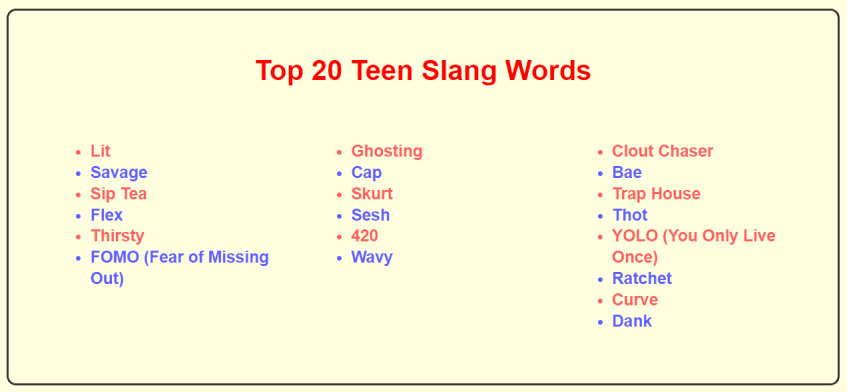TBC Meaning
TBC stands for To Be Continued or To Be Confirmed.
TBC is an internet slang initialism that is used to show that something is not yet finished or not yet decided.
How Is TBC Used? Use Cases & Examples
The abbreviation TBC means that the conversation or action has not been completed; there is more after the break. TBC is often used to indicate a pause in conversation or to signal the end of a TV show that is running several episodes. TBC can also mean “to be confirmed,” indicating that details or dates have not yet been finalized.
Examples of how your teen might use the slang term TBC:
- Simon: Teamwork is important. It helps to put the blame on someone else.
Martin: That’s true! TBC. The boss has just walked in! - Anna: Did you see her last night?
Charlotte: There’s a lot to tell, but I’ve got to go. TBC tomorrow. - Jenny: What’s up?
Caroline: I’ve got some great gossip.
Jenny: I love it! What do you know?
Caroline: Oops, my boyfriend is at the door. TBC tomorrow.
Jenny: No! That’s so not fair.
How to Identify If Your Kids Are Using the TBC Slang Word
The slang term TBC is harmless, but there are always new trends in the slang world for you to keep up with. To keep kids from engaging in risky activities, you need to pay attention to every slang term they use. Here are two ways to identify the slang word TBC:
1. Check Their Phones Directly for the TBC Slang Word
The good thing is that you can check your kids’ phones directly to see if they’ve used the TBC slang word. This means you need to access their text messages, search history, and chat messages on WhatsApp, Snapchat, Facebook, Skype, Line, etc.
Cons:
- Affect your relationship with your kids
- Troublesome
- Can’t detect dangers timely
Pros:
- No need to install any app
2. Install A Parental Control App to Monitor the TBC Slang Word
A good parental control app can help you spot harmful teen slang words on your teens’ phones. It allows you to access their text messages, social chats, and search history for teen slang expressions such as TBC. It also lets you set up alerts for certain teen slang words to get instant email notifications. Then you can keep your kids from inappropriate web stuff and ensure their safety.
Pros:
- More features like chat monitoring, GPS tracking, call recording, surrounding recording, etc
- Instant alerts
- Easy to install and use
Cons:
- Some apps are not free
Parental Control Apps to Detect the TBC Slang Word
Android:
- Google Family link:
It is a family parental control service from Google that helps you check search history for the TBC slang word, restrict content, set screen time, and more. - iKeyMonitor:
iKeyMonitor is one of the most powerful parental control apps. It monitors SMS, chat messages, and searched terms on kids’ phones. It will take screenshots/photos and send instant alerts to you on triggered alert words such as TBC. Besides, it will record calls, surroundings and block inappropriate apps to protect your kids from threats.
iOS:
- Apple Screen Time:
With Apple’s built-in parental control setting, you can manage app limits, set content restrictions, and more. Just unlock the iPhone or iPad, then go to Settings and tap on Screen Time. - Norton Family Parental Control:
Norton Family provides insights that help you foster a healthy online/offline balance for your children and their devices. - Kaspersky Safe Kids with GPS:
Kaspersky Safe Kids is a popular parental control app that provides web monitoring, app blocking, filtering, and more. - Alertbird Parental Control:
Alertbird is a parental control app for iOS that monitors the TBC slang term and other dangerous words. You will be notified immediately if it detects alert keywords in your searched terms and chat messages, such as the TBC slang word.
Tips to Talk With Your Kids About the Use of the TBC Slang Word
Slang terms with multiple meanings require context to understand. There must be a frame of reference before a judgment can be made on a message that contains these slang expressions. Here are some topics to talk to your kids about being a critical reader:
- Do you know someone who starts commenting on a post before reading the entire article?
- Some say there is no objective news coverage. What do you think?
- When I hear a reporter say something vague, like a military expert, I start to doubt their source. How would you rate what you heard or read online?
- What do you do when a friend posts clearly false information?
